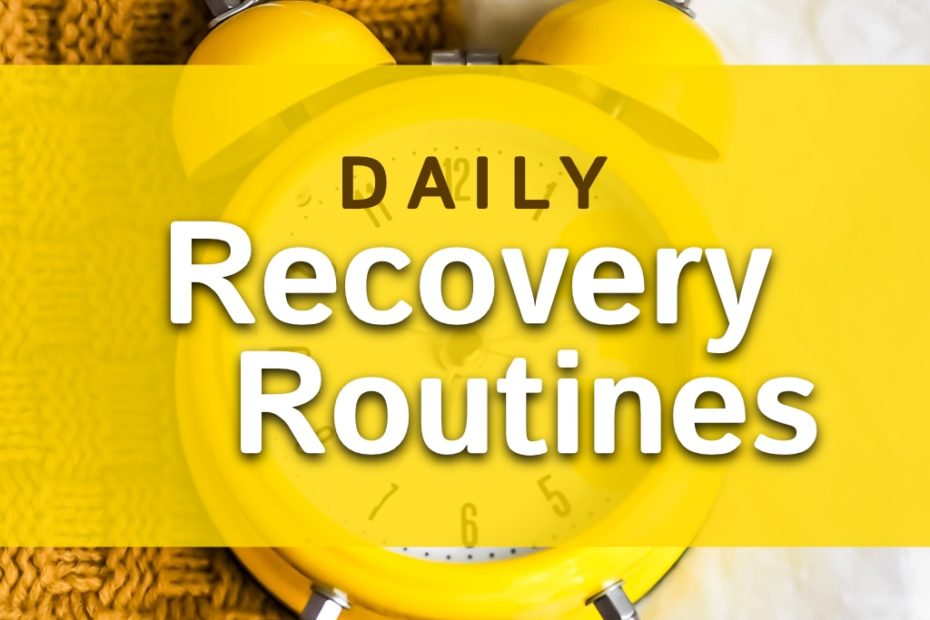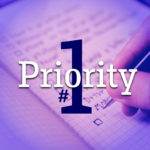? Psst… This is more of long-form resource than a quick read, so feel free to come back and read it piece by piece on your own time.
Introduction
A long time ago, when I was a sad and confused newcomer, my new sponsor told me “This program didn’t work for me until I started taking actions every day. So I’m giving you this morning routine now. If you do this every day, you’ll be just fine”. He then laid out this set of actions I would come to love (and sometimes hate) for the years since:
1. “In the morning, as soon as you can, get on your knees and say “God, thank you for a sober night, please grant me a sober day”.
2. Then recite the first 3 steps as a prayer (“God, I’m powerless over _… you can restore me to sanity…”, then the 3rd Step prayer)
3. Read a page from the Big Book and a page from the White Book
4. Make 3 phone calls a day and go to 3 meetings a week
5. At night, get on your knees and pray “God, thank you for a sober day, please grant me a sober night”.
That’s the original list. Since then, every time I’ve diligently stuck to these original actions, my recovery has been in a good place. I’ve felt stable, comfortable and “cleaned out”. And when I’ve gotten too comfortable and let those actions slide, I’ve only suffered.
On an average day, I spend at least 23 hours outside of meetings. So it’s important to bring the program into my daily life. Otherwise I don’t stand a chance.
For this article I reached out to our local English-speaking fellowship Israel to find out what other daily recovery routines people have. I hope you will find this to be useful.
Of everyone who responded, the amount of daily action varied considerably. Some members had none at all, some only did night, and some only did morning. The most intense response I got was: “Every day by 8 AM I’ve worked out, prayed, meditated, done my DSR, and a 10th Step inventory.” (spoiler alert: he has really amazing sobriety. I wonder why.)
The sobriety of respondents ranged from several weeks to over 30 years, with an average of about 3 years of sobriety.
Think of this as a sort of “idea library” you can use with your sponsor to upgrade your own personal daily recovery routine!
Daily Recovery routines: a collection
Here are several daily programs from different members.
Some are long, some are short, but they all work. As always, ask your sponsor before making any changes to your program.
—
#1
I once heard an AA member say: “every morning I wake up with untreated alcoholism”. If I don’t connect right away I’m liable to make decisions based on self.
So every morning, I do Step 11, like this:
- I pray a selection of program prayers my sponsor gave me. The prayers are themed on Steps 1, 2, 3, and 11.
- Then I do a short writing exercise:
For my first year, my sponsor had me do the following:
1. Set a 1 minute timer, and write everything that comes to mind during that minute
2. Then cross out everything I’ve written that’s selfish.
3. What’s left is God’s will for me today.
Eventually after a year of doing this I found I was writing the same thing every morning, so my sponsor started me on a new format – now I read a little, and then meditate on what I’ve read for one minute .
- Lately I’ve also started reading the daily reading from the Real Connection. (a helpful WhatsApp group sends it to me every day)
- Throughout the day, I pause to pray a short Step 11 prayer “when agitated or doubtful” (BB. 87)
Every night:
- I review my day, looking for where my character assets and defects have played out
- I pray the 7th Step prayer
I do the inventory only in my head, with no writing. As my sponsor told me “if it involves writing, you’re not going to do it every day” 🙂
—
#2
This member mostly does a morning routine:
“My daily routine is in need of improvement in content and consistency. My morning routine is pretty consistent, with program text reading and program prayers. My evening and bedtime prayer routine has improved recently—it now exists. It includes, optimally, reciting structured and personal prayers from program and my religious tradition. This component is done a few times a week.
I now, for the first time, participate in a daily structured gratitude exchange with another member.”
—
#3
* I pray to my Higher Power every morning
* Every morning I call my Daily Sobriety Renewal (DSR) partner (see here for an example DSR format)
* I do a daily Step 10 which I share with someone
* I try to be in touch with my sponsor or a sponsee
* Every day I try to be helpful to somebody
—
#4
This member solely does morning meditation:
“Meditation brings me back to myself. As I sit still and follow my breath, my busy mind interrupts me with random thoughts about the past, events or conversations that took place recently or long ago .
Or my worried mind takes me on a trip into the future, into “what if” land where reality becomes a nightmare and my dreams become dismal failures.
But through it all I keep returning my attention to the breath.
After twenty minutes or more of mindfulness, my alarm rings and I open my eyes. I usually feel calm and happy and that for now all of that negativity that plagues my brain has been purged and I begin my day in a good way.”
—
#5
Here’s how another does morning prayers:
- Every day I start in bed with a prayer of thanks for a sober day yesterday
- While still sitting in my bed, I do Steps 1-2-3: First I recite the exact text of the steps, and then I go into detail. Like this:
Step 1: I pray about my lust, character defects, top plates, etc. “God, I’m powerless over my lust, my finances, my impatience, intolerance, etc.”*
Step 2. Talk to God – “God, you love me, care about me, everything is the way it’s supposed to be”. This can be a really beautiful.
Step 3. I do the 3rd Step prayer on my knees, with my palms open
Sometimes I need to repeat this whole process because I’m still sleepy 🙂
—
#6
When I wake up I:
- Get on my knees and pray
- Write a fear & gratitude list.
- Write a “powerlessness list” – all the things I’m powerless over today.
- I read a page from each of my two recovery books
Over the course of the day:
- I make 3 calls
- Call my sponsor
Over the week:
- I attend 3 meetings a week
- I stay in touch with my 3 sponsees
- I do service in my 2 service positions
This may scare some people,. It’s really demanding! But it’s what I needed to do to stay sober for so many years now.
—
#7
Before I get out of bed I:
- Say the Serenity Prayer
- I say Steps 1, 2 & 3 on my lust,
- I also pray the Steps on my character defects, and on all my anxieties
- I then talk to God in my own words about myself, my family, and those close to me
- I leave my phone outside the bathroom and instead bring in my current program book
The rest of the day:
- I make sure to make some calls
- Every night I read some literature in bed
—
#8
Every day, I need to:
- Call my sponsor
- Make 3 calls
- Do 10 minutes of meditation (at least sitting quietly and doing nothing or going on a 10-minute walk)
- 1 page of spiritual reading in the morning
Over the week:
- I attend 4 face-to-face meetings
- 3 times a week I go walking/running for a little under an hour
I do none of these perfectly. I’ve missed every one of these of them, but they help constantly redirect me to the spiritual path.
—
#9
Here’s my program:
1. DSR – the first question (“How are you powerless?”) helps a lot. While it alone doesn’t keep me sober, it adds awareness. The gratitude section is also great.
2. Daily Calls
The most important call I make is every night, after I come home for the night.
Lust is a tempting way to relax, after a long day. If I wait until I’m triggered, I’m not going to make that call when I need it. My sponsor told me to call someone every night, as soon as I get home.
Here’s what I share on phone calls:
- What’s going on with me. This is often more about difficult emotions than lust – when I’m upset, hurt, etc. I also share if I’m not feeling anything at all. That also needs to be shared.
- I share any “small” actions of lust I’ve taken – there’s no difference between “large” or “small” actions – I need to be accountable about all of them, and they all must be surrendered.
3. Prayer/meditation: I talk to God on my level about what’s going on – trying to surrender my will.
4. Self care
For me, my primary self care is weightlifting. It’s absolutely integral to my program.
After a slip, my sponsor always asks how my self care is. When I slip, I’ve always stopped working out weeks before. To be in a good place, I must take care of myself.
Working out doesn’t keep me sober if I’m not also working a program, but nowadays it’s absolutely indispensable to me.
—
#10
Every day:
- When I wake up I say “Good morning God. Thank you for a sober night, please grant me a sober day”. Sometimes I also add the Serenity Prayer.
- In the bathroom, I try to do Steps 1-2-3 on my knees. As I’ve long gotten bored of the program prayers and can mumble them mindlessly, it helps to try to say them in my own words. I also tell God in explicit detail all the things my lust is tempting me to think about.
During the day;
- Make 3 phone calls (receiving them doesn’t count)
- Try to be helpful to others
- Try to practice the opposites of my character defects (i.e., being responsible at work, being communicative instead of ghosting everybody, etc.)
When needed:
- If I feel overwhelmed – do a fear & gratitude list
- If resentful – Step 10 inventory
- I whisper quick prayers to God all the time (“I’m powerless please help me”, “Please bless her”, “Please be with me”, etc.)
- Use the tools of the program to surrender my fantasies and street lust
- Sharing explicitly on the phone when I need to
Over the week:
- 3 meetings (in-person or on Zoom)
- Call my sponsor
- Make time for sponsees, if I have any
- Once in a while I listen to a recovery recording
- Self care:
- I try not to eat too much
- I try to walk as much as possible
- I try to get enough sleep (I’m absolutely awful at this, but I’m trying to do better)
Every night:
- I fill out a quick Step 11 inventory on my phone. I’ve gotten pretty fast at it.
- I read a little from my current recovery book, and from my faith tradition
- I pray that God save me from lusting during the night.
- I get on my knees and say ““God, thank you for a sober day, please grant me a sober night”
I often skip some of these, and always regret it, so I try to do most of them. When I do I feel great.
—
#11
My routine has changed over time. In early recovery, I did many more actions. As I’ve grown in recovery, my sponsor has changed things. It’s important to decide based on the quality of your sobriety.
Here’s my morning routine:
- DSR every morning
- I do the traditional Step 10 night inventory in the morning, when I’m more rested and can think clearly.
- Meditation (this has developed a lot over the years)
- 1 phone call besides DSR
- Regular literature reading (at least one page)
During the day:
- Make a midday phone call
- Self-care:
- Daily Exercise (I look at it as part of my Step 11 meditation)
- Eat right
- I talk to God in my own words “If a day goes by when I haven’t spoken to God at all, that’s not a good sign!”
- The frequency of this has changed over the years
- Now I talk to God before doing most things
- “Spot check” inventory when warranted (See 12&12 p. 89)
I do the bulk of my sober work in the morning. By 8 AM I’ve worked out, prayed, meditated, done my DSR, and a 10th Step. I need that to be fit all day.
Over the week:
- I talk to my sponsor once a week
- Regularly meet my sponsees on Zoom
- I take phone calls
- Attend meetings a few times a week
- Be of service beyond program, and home and in other ways
Every night:
- I make a phone call if I can
Miscellaneous:
- There was a time in early sobriety when I read the 18-Wheeler (SA p. 157-168) every day
- At one point I regularly listened to recordings. I don’t do that at present
- I discuss with my sponsor if I should change in my daily program. Its was important to discuss things with him and not make those decisions on my own
—
Thus concludes our little collection of daily recovery routines 🙂
—
It doesn’t need to be perfect
As a perfectionist, at this point I want to give up. This list of actions is huge, and I want to do all of them, and if I don’t do them all, that makes me a failure, right? What if I miss a day?
Here’s where that program principle of “progress, not perfection” kicks in.
Every single member who submitted a routine mentioned that they don’t do it perfectly, and often miss an action, or an entire day.
One member wrote:
“My evening and bedtime prayer routine has improved recently—it now exists.”
For me personally it’s so important to remember that 1% beats the heck out of 0%. I just have to try. But the more I do, the more peaceful, serene and “cleaned out” I feel.
If I miss a day, I just need to accept the past (even 1 minute ago is already the past that needs to be accepted), accept that I’m imperfect, and try to do better now. For me that’s part of one day at a time – I need to accept my past, and humbly ask God to help me do today’s work today.
Finally, it’s important not to take on too much. If I resolve to do an enormous overcomplicated daily program with 37,082 unique actions I’ll end up doing nothing. Better a little than nothin’ at all!
Conclusion
My daily routine is the heartbeat of my program – if it’s doing OK, my recovery is nice and stable. If it starts to falter – watch out! Fortunately, it’s relatively easy to get back on track, or even upgrade my program to get me to an even better place – as always, while consulting my sponsor before making any big changes.
Good luck on your daily journey, and as always we’d love to hear from you!
—
Thank You
Thanks to Allison, Ari B, Ari G, Benny, Chanan, Elchonon W, Fergus, Gershon, Mendel W, and Shloime M for contributing their personal daily recovery routines.
Thanks to Shmuel, Ari G, & Yitzy R for reviewing this post
Something new, every week!
Get a fresh burst of recovery directly to your inbox, every Monday.
[mailjet_subscribe widget_id=”2″]Got something to share?
Learn more about article submissions ›
Got feedback? Get in touch here. ›






